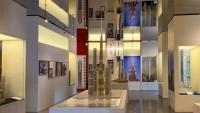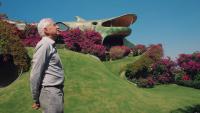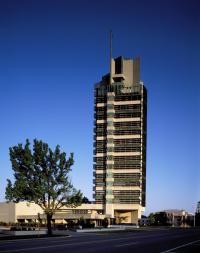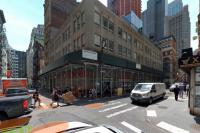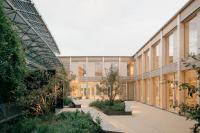Jixian Buddhism Development
Tianjin, China
Vision for the Buddhist Retreat
A place to promote exchange on knowledge and wisdom
A place to integrate with nature for the body, mind and soul
Through navigating within series of spaces, visitors shall rediscover the purity in their mind
as the Buddhist in pursuit of "Self Awakening明心見性
The masterplan will comprise of the following five major elements: a Temple, a Buddhist Museum, a Cultural Exchange Centre, a Monastery, a Hotel; forming three main zones: the Buddhist Cultural Zone, meditation Zone and the Interactive Zone (for commercial activities). Each zone will be different in terms of programs and functions, but the overall architectural language should be of a coordinated manner offering a gradual transformation in character throughout the masterplan. A coordinated design language should be expressed through architectural form, application of material and spatial composition, arrangement of buildings should take full advantage of the ecologically rich and natural environment of the site.
The temple, Museum and the Cultural exchange Centre will form the Buddhist Cultural Zone, a major anchor point of the masterplan open to all, both the Museum and the Cultural Exchange Centre should be located in close proximity to the water body, or be partially integrated with water to maximize potential visual effect. The Architectural form for the Cultural Exchange Centre should be Iconic and grandeur, manifest by simple and pure lines and planes. The 3 key architectural elements should be responsive to one and other, for example in the application of material to complement each other forming a harmonious gateway by the waterfront.
Learning centre and Hotel should take advantage of the site’s tranquil character at the mountainous area; where visitors can experience an inward and intimate character allowing individuals’ mind to be medicated. Hotel shall scatter organically deep into the mountainous area, each condominium should be different to one another to celebrate the diversity of contemporary world. With natural landscape and waterscape interweaving between individual condominium visually screening off one and other, creating an opportunity for inhabitants to have a personal dialogue with nature.
The Monastery shall be another key anchor of the masterplan, with sizeable footprint forming a frontier to the condominium. Architectural language should be pure and simple, spatially permeable to blend into surrounding natural landscape creating the heavenly (天人合一)experience.
Hotels and other commercial elements should form a close cluster of development and should be highly accessible from the main entrance points of the masterplan.
Through elegant and simple geometrical forms, with a modern material palette to create a contemporary character, generating a subtle difference to the other zones within the masterplan.
The Landscape and public spaces are the key element in this journey for "Self Actualization" 明心見性, the overall landscape masterplan should form an overarching spatial skeleton in connecting the 3 zones as well as the surrounding natural settings, creating a fine balance between visual and physical experiences and complementing the various architectural languages within the masterplan.




